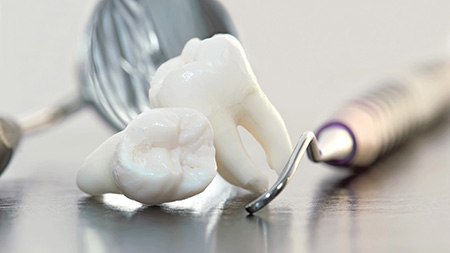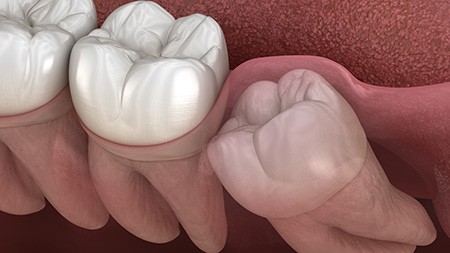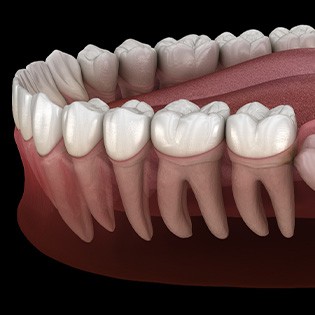Wisdom Tooth Extractions – Tappan, NY
Ready to Remove Your Third Molars
Over the years, maybe you’ve heard people – friends, family, etc. – talk about “wisdom teeth.” These unique parts of your smile can sound positive at first, even helpful. Still, the fact is that leaving them in place can damage oral health over time. We at Smile More Dentistry offer wisdom tooth extractions in Tappan to keep that from happening. To learn more about them and how they work, please keep reading or book a visit today.

Why Choose Smile More Dentistry for Wisdom Tooth Extractions?
- Sedation Dentistry Makes Any Procedure a Breeze
- Dental Office Led by Many Dental Specialists
- Committed to Gentle & Comfortable Care
What are Wisdom Teeth?

Wisdom teeth, or “third molars,” are the last adult teeth to erupt in a person’s life. They emerge between the ages of 17 and 25 (when present), sitting in the very back of the mouth.
Unlike other kinds, wisdom teeth don’t serve a purpose for people today. They’re relics that helped our caveman ancestors but aren’t needed for modern diets. This factor has led to fewer wisdom teeth – people can be born with one, two, three, or none. Such teeth don’t always need removal, either.
Why Do Wisdom Teeth Need to Be Removed?

In the end, wisdom teeth can pose grave threats to a patient’s smile. Many qualified dentists will often remove them to preserve your long-term oral health.
You see, most wisdom teeth lack space to erupt correctly. Modern people’s mouths simply don’t have room for these molars to emerge well. As a result, wisdom teeth often get trapped in the gums and cause pain, infections, cysts, etc. An emerging wisdom tooth can also lead to dental overcrowding, making your smile crooked.
Common signs you need a wisdom tooth removal are:
- Pain while eating
- Facial swelling
- Jaw stiffness
- Difficulty opening your mouth
- Bad breath
What to Expect from the Wisdom Teeth Procedure

Depending on the patient, a wisdom tooth extraction can vary in its steps. Whether the relevant teeth have erupted will affect the process.
For example, our team will perform a simple removal if the teeth have erupted. This option would start by numbing your mouth so you don’t feel pain. Next, we’ll use an elevator to lift the wisdom teeth and make them easier to see. We’ll then use forceps to grip and wiggle them free of their sockets.
If the wisdom teeth are impacted, our team will take a surgical approach. We’ll start by making an incision in your gums once your mouth is numb. With the teeth now plainly visible, we’ll then extract them whole or break them into smaller pieces, removed one by one.
Recovering from Wisdom Teeth Extraction

Once the extraction is over, your mouth will feel sore or sensitive for a while. This effect should fade within a few days and won’t have any lasting impact on oral health. To help you manage it, please use the following after-care instructions:
- Take over-the-counter or prescribed medications as needed.
- Try not to drink through a straw.
- Rinse your mouth with salt water 24 hours after surgery to clean the area.
- Stay clear of tobacco products.
- Get ample rest for the best recovery time.
- Use a cold compress to decrease swelling.
If you have any treatment concerns, don’t hesitate to call our office. We’re eager to help you deal with wisdom teeth and the rest of your smile!
Understanding the Cost of Wisdom Tooth Extractions

Wisdom teeth seem to cause nothing but trouble for some. One of the factors that many people worry about is the cost of their procedure, so we’re here to help. During your consultation, we will discuss the financial aspects of your treatment in detail, including your payment options. Until then, here are some things to keep in mind.
Factors That Can Impact the Cost of Wisdom Tooth Extractions

The cost of wisdom tooth extractions can vary on a variety of factors. Here are two that have the biggest influence on cost:
- Number of Teeth: Some people don’t develop all four of their wisdom teeth; some people don’t need to have all of their wisdom teeth extracted. When we examine your mouth we will determine what the best solution is for you.
- Impaction: If you have wisdom teeth that are impacted, the procedure is more complicated. This can lengthen treatment time, increasing the cost.
Does Dental Insurance Cover Wisdom Tooth Extractions?

Wisdom tooth extractions are considered by most dental insurance plans to be a “major restorative procedure.” This means that this type of procedure is usually covered by about 50% when medically necessary. However, everyone’s dental insurance plan is a little bit different, so you should confirm this with your provider ahead of time to be safe. We would also be happy to help with this process. At Smile More Dentistry, we are eager to help maximize your benefits and minimize your out-of-pocket costs.
How to Make Wisdom Tooth Extractions Affordable

If you don’t have dental insurance, this doesn’t mean that you will be left completely on your own. By joining our in-office oral health savings plan, you can save on treatments completed at our practice. We are also happy to accept payments through CareCredit – a third-party financing company that can split the cost of your treatment into manageable monthly installments with little to no interest. To learn more about your financial options, don’t hesitate to reach out to one of our friendly team members.
Wisdom Tooth Extractions FAQs
Why Do We Have Wisdom Teeth?
Extracting wisdom teeth is so common that many consider it a rite of passage for teens entering adulthood. It’s only natural to wonder why we evolved them in the first place if they’re so consistently problematic.
It’s believed that early humans existed on a tough diet of raw meat, roots, berries, nuts, and leaves that were hard on their teeth. They were likelier to damage or dislodge their molars during their youth without access to cooked foods, utensils, and dental care. They might have needed these late arrivals to compensate for injured ones that were no longer usable.
Today, they’re considered a vestigial feature because they no longer serve a necessary, functional purpose.
Does Everyone Have Wisdom Teeth?
Although most people grow four wisdom teeth, one for each quadrant of their mouth, that’s not the case for everyone. In fact, a 2015 article published in the Dental Research Journal, an estimated 5% to 37% of people are missing one or more of these molars. It’s possible to have only 1, 2, or 3, and some lucky folks have none! While the reason for this is unknown, many experts believe genetics play a part. You’re more likely to miss a wisdom tooth or two if your parents do.
However, remember that just because you can’t see any additional pearly whites doesn’t mean they’re missing. Wisdom teeth frequently become trapped in the jawbone or don’t fully erupt, but an X-ray with your dentist can tell you how many you have.
Is Wisdom Tooth Removal Painful?
Many patients fear extractions because they’re worried the procedure will be long and agonizing, but that’s thankfully not the truth! Before starting your procedure, we will apply a topical anesthetic to the affected tooth so it doesn’t feel pain. We also offer multiple forms of sedation that can help you feel relaxed and comfortable the entire time.
It’s normal to feel some mild to moderate aches after the meds wear off, but usually, these dissipate within a week or so. However, your mouth must form a blood clot over the site to protect the recently exposed nerves and bone tissue. Following our post-op instructions in detail is the best way to heal as quickly as possible without damaging it, which can cause a painful condition known as dry socket.
What is the Best Age to Get Wisdom Teeth Removed?
There’s no expiration date for when you can have troublesome wisdom teeth removed, but usually, it’s recommended in your late teens or early adulthood. This is because it’s typically easier for younger jaws to undergo and recover from the procedure. As you age, the roots grow longer and more embedded in your jawbone, which makes the procedure somewhat more complex in older adults. Plus, it may take longer to mend because your body’s healing process slows as you gain years, too.
Furthermore, it’s often easier to schedule wisdom tooth extractions during high school and college because of several long weekends and holiday breaks from school. These are perfect opportunities to have your appointment and recover before heading back to class.
I Need a Checkup & Cleaning I Have a Broken or Chipped Tooth I am Missing One or More Teeth I am in Pain or Had an Accident I Want to Improve My Smile I Want a Straighter Smile I am Looking for a Dentist for My Child I am Afraid and Afraid I am Worried About Bad Breath & Bleeding Gums I Have Migraines, Headaches or Jaw Pain View Our Services

